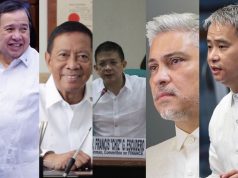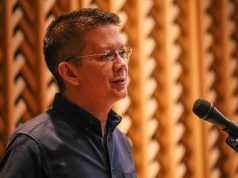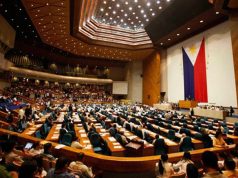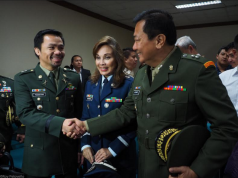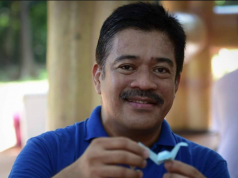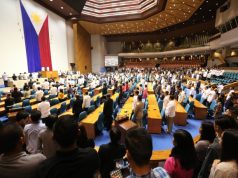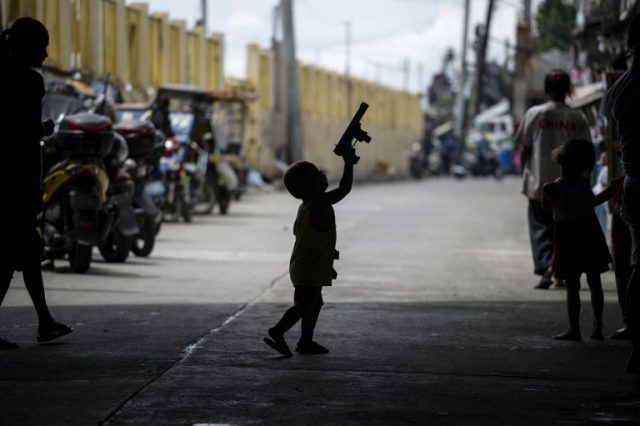
MANILA – The Senate re-assigned to housing for soldiers and body cameras for policemen the P900-million outlay of the National Police for its controversial Oplan Double Barrel against illegal drugs and P500 million of the DILG’s Masa Masid, as it passed on third and final reading Wednesday night the proposed 2018 national budget.
The Senate-approved proposal is a P3.767-trillion 2018 national budget, with the bulk allocated for the government’s various social services programs.
With 16 affirmative votes, zero negative vote and no abstention, the Senate approved House Bill No. 6215, which was sponsored by Senator Loren Legarda, chairperson of the Senate Committee on Finance.
According to Legarda, the Senate version of the 2018 national budget is a “pro-people” budget, which will address and the most basic needs of Filipinos.
Legarda thanked those who supported it. “This is a beautiful, great experience, even if I have to sacrifice my personal leisure time, 6 months in a year starting August to December. I would not change the experience.”
Minority Senator Risa Hontiveros explained that she voted in favor of the Senate version of the budget as it excludes the allocation for the war on drugs of the PNP.
“Nalagay natin ‘yan sa housing ng ating mga sundalo at pulis, body cams as well. Wala na ‘yung [We placed that money in housing for soldiers and policemen, and body cameras as well. There’s no more] Masa Masid, Double Barrel,” Hontiveros noted.
BICAMERAL PANEL
The two chambers of Congress will face each other at the bicameral conference committee Thursday to settle differences in their versions before sending the bill to President Rodrigo Duterte for signing into law.
The Senate elected Legarda as the chairperson of the bicameral conference committee on the disagreeing provisions of the national budget with Senate President Pro Tempore Ralph Recto, Senate Minority Leader Franklin Drilon and Senators Sonny Angara, Nancy Binay, Panfilo Lacson, Joseph Victor Ejercito, Cynthia Villar and Juan Miguel Zubiri as members.
In her sponsorship speech earlier, Legarda said: “The 2018 General Appropriations Bill is a national expenditure program touted by the administration of President Rodrigo Duterte to bring about inequality-reducing transformation, or pagbabago; a budget seeking to enhance the social fabric, or malasakit; one that will increase the country’s growth potential, or patuloy na pag-unlad; and an expenditure program that seeks to maintain the foundations for sustainable development.”
Legarda further described it as, “a budget that addresses the basics. A budget where we made room and space to keep those who are in the cold, warm; to feed those who are hungry and dispossessed; a budget that reduces enmity and restores the peace.”
EDUCATION, INFRA SPENDING
The Education sector received the highest budget allocation in the Senate version, with 684.33 billion. This includes the budget of the Department of Education (DepEd) and its attached agencies at P 561.58 billion, State Universities and Colleges (SUCs) at P62.33 billion and the Commission on Higher Education (CHED) at P60.42 billion.
The Senate-approved budget allocated P51 billion to pay for free college education in all of the country’s state universities and colleges (SUCs) and other state-run educational institutions, apart from a P10 million fund to “capital outlay and free Wi-Fi in all SUCs.”
DepEd increased the monthly chalk allowance for public school teachers from P2,500 to P5,000 and allocated around P1.820 billion for the program.
The Department of Public Works and Highways (DPWH) received the second largest share with 598.57 billion, “to spur infrastructure spending and herald the so-called Golden Age of Infrastructure.”
The third highest allocation went to the Department of Health (DOH) and its attached corporations with 174.47.43 billion including a P3 billion fund for the universal health coverage and P6.5 billion for the health benefits for government employees.
The Department of Interior and Local Government (DILG) got a P170.24 billion budget followed by the Department of National Defense (DND) with P147.85 billion, the Department of Social Welfare and Development with 139.27 billion.
The 2018 budget expanded funding for government programs to help break the cycle of inter-generational poverty and promote inclusive economic growth for all Filipinos, Legarda pointed out.
She said government would continue to support DSWD’s Conditional Cash Transfer Program by upholding its P89.41 billion allocation, “of which P31.68 billion is for rice subsidy.”
An additional P3 billion was allocated to establish or repair the DSWD centers nationwide to provide “respectable shelter to poor families and individuals, especially minors.”
The Senate had set aside P270 million to fund the “Early Childhood Care and Development/Nutrition Package for the First 1000 Days” under the National Nutrition Council, which is expected to benefit children and adults in 16,419 barangays worst-hit by malnutrition.
The proposed 2018 budget also retained the P2.6 billion in irrigation fees subsidy under the National Irrigation Administration to help the livelihood of farmers and lessen fees collected from farmers’ associations.
The Senate had made available a P10 billion fund under the National Disaster Risk Reduction and Management (NDRRM) Fund to aid in the recovery and rehabilitation of Marawi City.
BIGGER FUNDS FOR AFP, PNP
Like social services and infrastructure spending, the country’s defense and law enforcement sectors are also getting substantial increases in their budgetary allocations next year.
The Senate allocated P131.628 billion to the Philippine National Police (PNP) next year.
“We cut the double barrel and Masa Masid of the PNP and DILG while PDEA’s budget increased by P1.213 billion,” Legarda said during the plenary.
She noted that the same budget included P50 million for the acquisition of body cameras “to be used by police officers in highly-urbanized areas.”
The Armed Forces of the Philippines, in turn, was allocated P141.860 billion, to complement the AFP Modernization Program.
To prevent any event like the Marawi crisis from happening again, the Senate also allocated an additional P100 million intelligence fund for the National Intelligence Coordinating Agency (NICA), and increased AFP intelligence fund to P137.312 million.
RISK PREPAREDNESS, ADAPTIVE CAPACITIES
Legarda said that a key aspect of the Senate’s proposed 2018 national budget was that it “integrated and mainstreamed disaster risk reduction and climate change adaptation and mitigation strategies in government programs.”
“We firmly believe that building an inclusive and prosperous economy requires us to continually strengthen our resilience to impacts of natural hazards and climate change,” she said.
She said the Senate version of the 2018 budget also required every local government unit under the responsibility of the DILG to conduct regular evacuation drills in coastal communities that were at risk of storm surges and landslides.
“These drills should simulate real emergencies and should teach our people basic survival skills; how to avoid panic; as well as help them ascertain proper responses during actual natural hazards,” she said. – With a report from Faith del Mundo, News5




